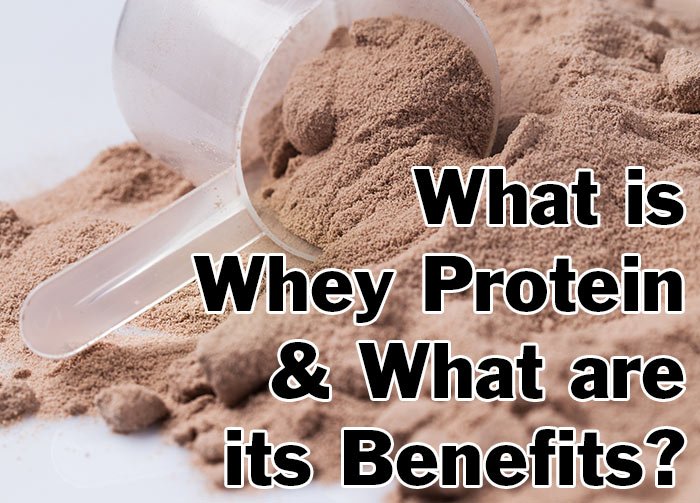Last Updated on November 28, 2016 by Marc Seward
Whey Protein
Many people have traditionally associated whey protein supplements with body building and while there is good reason for this, whey protein can offer numerous benefits whether you are a healthy muscle bound male or a humble middle aged housewife. In fact, whey protein has been extensively studied scientifically and is now known to have health benefits ranging from building muscle mass to heart health and diabetes. It is one of the most popular supplements on the market today and with very good reason. This article will tell you why.
What is whey?
You will remember the popular nursery rhyme from your childhood where little Miss Muffet sat eating her curds and whey. I never did have any idea what whey was and nor did I ever think to ask. Well, whey is actually a protein found in milk.
Whey proteins are derived as by-products from the cheese production process. Whey consists of protein, minerals, lactose, immunoglobins, and a trace amount of fat. It is dried before being sold in a powder form which can be reconstituted by mixing it into fluid. When shopping for whey protein, you should note that there are 3 different types available:
- Whey Protein Concentrate: This type of whey protein has low levels of cholesterol and fat and is more bio-active. It is the least processed type of whey protein and regarded as the best option.
- Whey Isolates: This form of whey is less bio-active and the fats have been removed.
- Whey Hydro Isolates: his type of whey is significantly more processed and is not generally recommended.
What makes whey great?
1. It is a great source of protein
Whey protein is rich in important nutrients and an excellent source of high quality protein. It contains a high concentration of all the valuable amino acids and is easily digestible and more readily absorbed by the gut when compared with other sources of protein. (1)
2. Antioxidant Value and Glutathione
We are all aware by now of the importance to our health of antioxidants. Antioxidants are necessary to protect against cellular decay and to prevent diseases caused by oxidative stress including heart disease cancer and many degenerative diseases associated with aging.
One of the most important antioxidants for humans is an antioxidant called glutathione which is known as the master antioxidant because of its incredible benefits.
Glutathione is actually produced by the body and is found in every one of our cells but its production depends on amino acids such as cysteine which is often lacking.
Being high in cysteine, whey protein may help boost glutathione levels which in turn boosts out antioxidant defenses. Studies have indicated that whey protein could reduce damage caused by oxidative stress and boost he body’s glutathione levels. (2, 3, 4)
3. Promotes muscle development
As we age, so our muscle mass invariably and inevitably declines. A decline in muscle mass is also likely to lead to a gain in fat and all of the associated health risks of weight gain. Fortunately all is not lost and a combination of exercise and good quality protein intake can go a long way to slowing down his loss of muscle tone.
Studies recommend consuming around 25 o 30 grams of good quality protein at each meal in order to prevent the loss of muscle. (5) Whey protein is especially effective because it is a rich source of leucine, an amino acid which is known to promote development and growth.
When it comes to muscle growth, studies have demonstrated that whey protein is compares favorably with other sources of protein such as soy and casein. (6)
4. Whey protein may reduce blood pressure
High blood pressure is extremely dangerous and one of the major risk factors in coronary disease.
Many studies have already established a link between dairy product intake and blood pressure. The jury is still out and results so far have proven inconclusive but whey protein might help lower blood pressure and reduce the health risks associated with hypertension.
The reason that dairy products can reduce blood pressure is generally attributed to peptides known as ACE-inhibitors. Whey protein contains ACE inhibitors called lactokinins and certain studies on animals have established that they have a positive effect in reducing blood pressure. (7)
So far, there have not been many human studies on the effects of whey protein for human blood pressure. However, one study published in 2010 found that when overweight people took a high dose of whey protein each day for 3 months, their blood pressure fell by an average of 4%as well as improving vascular function. (8)
5. Whey Protein for Weight loss and hunger reduction
If you are trying to get in shape and let’s face it, most of us are in a constant battle, whey protein might be able to help us shift some of that unwanted excess. I can work in several different ways.
First of all, whey protein can help satiate the appetite and basically leave you feeling fuller and less likely to overeat throughout the day. Protein is extremely filling so adding whey protein to your diet should mean that you will consume fewer calories.
As well as suppressing the appetite, whey protein can boost he metabolism and actually help you to burn off more calories, especially when combined with regular exercise. High protein and low carbohydrate diets have been scientifically proven to aid in weight loss and there are fewer better sources of protein than whey. (9)
This recent study comparing various proteins found that whey protein was especially effective in burning fat and suppressing he appetite compared with other sources of protein. (10)
6. Inflammation
Chronic inflammation is extremely harmful and is an underlying risk factor for nearly every serious disease including heart disease and cancer. A review of numerous studies found that whey protein taken in high doses could significantly reduce blood levels of CRP or C-reactive protein which is a key marker of bodily inflammation. (11)
7. Blood Sugar and energy levels
Whey protein may help people suffering from diabetes and athletes looking for an energy boost alike. Studies show that whey protein helps stabilize blood sugar levels and also stimulates insulin production. It can also help prevent dramatic blood sugar spikes.
As far as athletic ability is concerned, whey protein increases glycogen levels and provides a much needed boost in energy during exercise. Whey protein also enhances the effects of leptin which is the hormone responsible for energy. It is readily digested and converted by the body into energy.
8. Cholesterol reduction
It is possible that whey protein could help reduce cholesterol levels including the bad stuff known as LDL cholesterol. High cholesterol is of course a major risk factor in heart disease and reducing it is very important.
Although more studies are necessary and those that have been done so far have had mixed results, several studies have been positive. One such study published in 2010 found that 54 grams of whey taken daily for 3 months resulted in a significant reduction in LDL cholesterol levels. (12) However I should be noted that other studies have been less positive and there is obviously a need for more research.
Possible Side Effects
There are no known side effects to whey protein but those with allergies to dairy products should avoid it and find other sources of protein.
How to take it
Whey comes in many shapes and sizes but the best forms of whey protein supplements are organic products from grass-fed cattle. This form of whey protein is the most bioactive and ensures that you get the highest amount of healthy compounds and minerals. Some cheaper products may contain artificial sweeteners and should be avoided.
There are many ways to take your whey protein supplements. You can simply add a large scoop or two to your breakfast shake or your favorite work out smoothie recipe. Try to get around 50 grams of whey protein each day for best effect.
(1) http://www.ncbi.nlm.nih.gov/pubmed/9405716
(2) http://www.ncbi.nlm.nih.gov/pubmed/21167685
(3) http://www.ncbi.nlm.nih.gov/pubmed/19638084
(4) http://www.ncbi.nlm.nih.gov/pubmed/17710587
(5) http://www.ncbi.nlm.nih.gov/pubmed/19057193
(6) http://www.ncbi.nlm.nih.gov/pubmed/19589961
(7) http://www.ncbi.nlm.nih.gov/pubmed/10794501
(8) http://www.ncbi.nlm.nih.gov/pubmed/19893505
(9) http://www.ncbi.nlm.nih.gov/pubmed/11838888
(10) http://www.ncbi.nlm.nih.gov/pubmed/25191896
(11) http://www.ncbi.nlm.nih.gov/pubmed/25671415
(12) http://www.ncbi.nlm.nih.gov/pmc/articles/PMC2926059/


Leave a Reply
You must be logged in to post a comment.